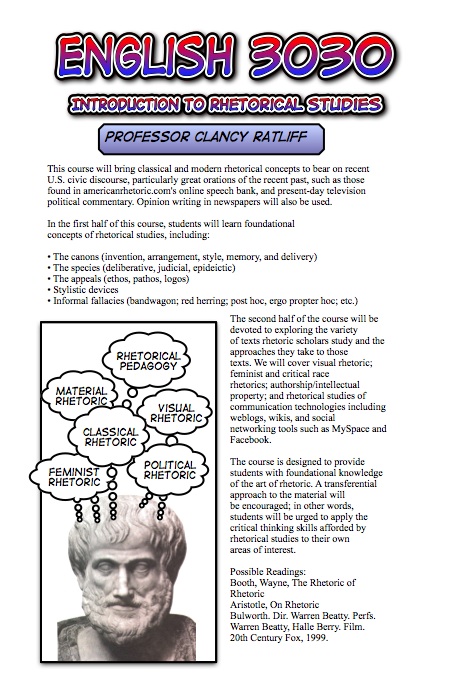I imagine that at one time or another I'll end up teaching ECU's Research Design in Rhetoric and Composition course (description -- scroll down). What I'd like to do is take the best aspects of the four (!) methods courses I took at the U of Minnesota, two in rhetoric and two in feminist studies.
In UMN's methods sequence, the year I took it anyway, the first half is an overview of the field, with readings of landmark articles with an eye toward sussing out what the methods and research questions are. We also read articles about methodological approaches, including Davida Charney's "Empiricism Is Not a Four-Letter Word" and others. In this first half, the final project was a lengthy proposal for a pilot study on a topic of our choosing. In the second half of the sequence, we did the study.
When I took the second half of the methods sequence, it had an applied methods approach in which we had guest speakers from the department talk about methods in which they'd had a lot of experience. We talked about survey design, interviewing, case studies, ethnography and naturalistic research in general, experimental design, think-aloud protocol, textual analysis, grounded theory, rhetorical analysis, content analysis, and similar methods. We read Creswell's Research Design, Denzin and Lincoln's The Handbook of Qualitative Research, McNealy's Strategies for Empirical Research in Writing, etc. Since then, they've designed it so that the second half of the methods sequence focuses on one method in depth. So far, they've done it on ethnography one year and case studies the next. While I generally think it's more useful to have a broad background in many methods than a deep familiarity with one method that you may not even be interested in using for your own research, I do, however, think the one-method approach is okay if the focus is either grounded theory or case studies. I'll come back to this in a second.
The feminist studies methods sequence had a heavy focus on the relationship between theory and method -- theory as truth claim, or knowledge claim, and method as how one arrives at a given knowledge claim. I got a good background of methodology at the epistemological level. We talked about the difference between feminist empiricism and feminist standpoint theory, the postmodern critique of knowledge claims, and many other problematics.
So: In my version of the methods course, I'd want to combine that emphasis on methods at the epistemological level -- critiquing the limits of certain methods, identifying questions they can and cannot answer -- with a broad knowledge of many methods, but with an emphasis on grounded theory and case studies, because they are, in my observation, the killer-app methods of composition studies. Finally, I want to make students aware of research design as a concept -- to be able to recognize it when a study is designed well and when it isn't. If one is designed well, the research questions, methods, and objects of analyses have a very clear coherence that makes sense even to a non-specialist in that field (within reason, of course). For example (and this is not a great example, but bear with me), let's say I have:
RQ: How has the teaching of technical writing changed over the last twenty years?
Object of analysis: interview transcripts
Method: interviews with senior scholars in technical communication who have at least twenty years' experience teaching technical writing
Well, okay. No doubt you can get some sense of how the teaching of technical writing has changed from talking to senior scholars who have a wealth of accumulated knowledge. But wouldn't it be better to try to do some archival research along with that -- look at syllabuses from the last twenty years, if available? Textbooks from the last twenty years? Add a method (possibly grounded theory) to analyze the archival data?
I'd do a lot of these kinds of exercises with students, except in a lot more detail.
Oh, and for something completely unrelated, but which I'd like to bookmark: There's an excellent Kos diary entry, The Middle Children of History, on the low level of activism among young people. The author, VoteHarder, pulls together a lot of different phenomena and shows how they work together to exacerbate apathy.



